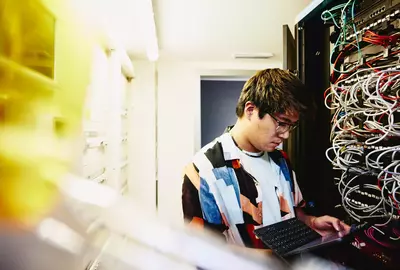Workers around the world are feeling the heat. Although it may seem like the job market is slowing down, many employers and businesses are scaling up. Many businesses also operate in a hybrid or remotely, so finding a new job isn’t as hard as it may seem.
The biggest change: job searches are moving to the digital world.
Employers and recruiters opt to interview potential candidates virtually vs. face-to-face interviews. More and more hiring managers are opting to do their initial interview virtually at least. However, just because it's via video call doesn't mean you should take it less seriously. Employers are still taking job interviews seriously, and so should you.
While virtual interviews may feel less formal than traditional interviews, properly preparing to ace them is just as important. Here are video interview guide tips for a successful interview.
set the scene
The environment that you're in is a major difference between in-person and virtual interviews. When you visit a potential employer, you can assess the work environment: does it seem friendly, inclusive, and open? A virtual interview allows a potential employer to judge your work abilities based on your background.
Before hopping on a video call, consider what your space says about you. Is there clutter in the background? Are there questionable photos or posters hanging on the wall? Are there disruptive noises?
Setting the stage for a successful interview is a good idea. Pick a well-lit space with a good light source, remove distracting elements from your background, organize your desk, and get a good set of headphones. The chance to make a good first impression is completely up to you.
If you are unable to declutter your background, try using the blur filter so that the mess behind you won't be distracting.
need more help with your interview preparation? we're here for you!
get more tipstest your tech
You don't need to test your tech when preparing for an in-person interview. However, this is essential for preparing for a video interview. Nothing is worse than spending the first few minutes of your job interview asking, “Can you hear me?”
Before your scheduled interview, take some time to make sure your tech is functioning properly. check your internet connection by calling a friend or family member for a trial run. Make sure your internet connection is strong.
Focus on video and sound quality. Check for things like choppy audio, pixelated images, and delays in transmission. Testing your equipment beforehand will give you the time to fix what you can or adapt to the situation.
If you experience difficulties, move to a room with a better internet connection. If push comes to shove, you can kindly request a telephone call instead of a live video interview. The key is to be proactive.
dress for success
We know you’re thinking it: dress shirt on the top and sweatpants on the bottom. This may seem like the ideal virtual interview outfit, but it might not be the one that gives you the most confidence. Think about how you dress for an in-person interview.
You wear something that makes you feel professional, strong, and amazing. How you feel about yourself often translates to how you perform in an interview setting, so try to plan your interview outfit from head to toe.
We don’t advocate going too far in the opposite direction, either. A full suit-and-tie combo in your bedroom is not the most realistic or authentic look. Find the perfect balance between professionalism and comfort by opting for a nice shirt or sweater on top and dress slacks on the bottom.
Let’s face it: you don’t want to flash your sweatpants to the hiring manager by chance.
pay attention to social queues
It's all about body language regarding communication and answering questions. Nonverbal cues play a major role. Think about your physical behavior, facial expressions, and mannerisms that direct the conversation.
In a virtual meeting, you must pay closer attention to social cues to keep the discussion comfortable and productive. Notice things like eye contact and nodding. This will give you an idea if your interviewer is engaged or distracted.
Pay attention to pauses in speech. Those will be your cue to jump in with a comment or question. Nonverbal communication doesn’t come as naturally in a virtual conversation, so be extra attentive to how you present yourself. Sit up straight, keep your eyes focused on the conversation, and try not to fidget.
With a little mindfulness, you can overcome the limitations of a digital discussion.
Check out these five common video interview questions.
send a thank you email
Write a quick thank you email once you’ve wrapped up the interview and changed back into your sweatpants. A virtual job interview is still a job interview, so following common social courtesies can help you land that job. Take this opportunity to highlight why you’re a great candidate, but keep it short and sweet.
Remember, you’re expressing your gratitude, not making a sales pitch. Match the tone of your email to the tone of your conversation.
Was the interview more formal and structured? Keep your email professional. On the other hand, if you had a casual chat with the hiring manager, don’t hesitate to be more informal.
Regardless of the format, your potential employer is still trying to decide whether you'd be a good fit for their team and their company. Treat your virtual job meeting with the same respect and attention as an in-person interview. Take the necessary steps to prepare, and you will feel cool and confident during your call.



